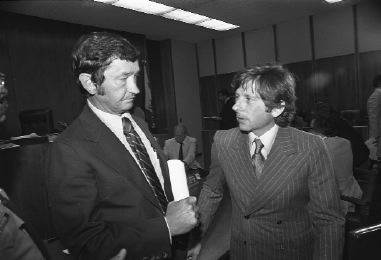Roman Polanski: Wanted and Desired

The name Roman Polanski conjures up different responses. To many film buffs he is the Polish wunderkind who rocketed out of the Lodz film school in Poland to direct the dark and mysterious Knife in the Water (1962), a tale of fear and betrayal on the high seas heralded for its thematic complexity and perfect camera placement. Others may identify him with his British films of the mid-1960s, including the terrifying Repulsion (1965), about a shy young woman (Catherine Deneuve), who slowly loses her mind as we witness her decline. Many will remember Polanski for his two great American films, the hugely influential Rosemary’s Baby (1968) or the near-perfect Chinatown (1974). A few may even recall that he won the Academy Award for best director in 2002 for The Pianist.
But for most people Polanski’s name will forever be linked with two criminal incidents: the slaughter of his pregnant wife, the actress Sharon Tate, by the Manson family in 1969, and his being charged in 1977 with “unlawful sexual intercourse” with a 13-year-old girl whom he was photographing for a magazine. While battling the sex charge, he fled the U.S. for France, where he has remained for the past three decades, out of the reach of American law.
Roman Polanski: Wanted and Desired, directed by Marina Zenovich, focuses on the legal drama that followed Polanski’s arrest and on his decision to fly to Europe, convinced that he was never going to get justice in this country.
Polanski himself was not interviewed for the film, but other major players in the drama are front and center, looking like they were brought in by central casting. The prosecuting attorney, Roger Gunson, is a dead ringer for Robert Redford. The defense attorney, Douglas Dalton, is Lincolnesque. The publicity-hungry judge, the late Lawrence Rittenband, looks like he belonged in Nixon’s cabinet. The alleged victim, Samantha (Gailey) Geimer, who speaks guardedly with her attorney beside her, seems bemused by all the attention being paid to this incident 30 years later.
It’s clear from the outset that the documentary is slanted in Polanski’s favor. Most of the accompanying interviews, including one with Mia Farrow, who starred in Rosemary’s Baby, drive home the point that Polanski is a hugely charismatic and talented filmmaker who was beaten, bruised and almost crushed by the incidents of his life. His mother was killed in a concentration camp, his father barely escaped one, and Polanski himself had to survive by his wits in the Polish ghetto during the war, before he discovered cinema as a way to make sense of a chaotic life.
Intentionally or not, the film opens a door on a subject larger than Polanski’s innocence or guilt. By juxtaposing the man’s tortured personal history with his remarkable skill as a filmmaker, the film broaches the issue of how society deals with artists. No one questions that Polanski committed the act he was charged with, and no one seemed too upset when the sentence was eventually reduced to 90 days. The subtext of the film is the notion that artistic talent might put one in a separate category when it comes to matters of law and morality.
Throughout history, many artists have been deplorable people. I remember seeing a fascinating documentary about the great German writer Thomas Mann and how he nearly destroyed his son, sucking the juice of the young man’s life to fuel his own work. Is that a case of cruelty that should never be accepted? Or is the life of a marginally talented young man somehow less important than the creation of a novel like Mann’s The Magic Mountain?
As it happens, Polanski has never regained the genius he exhibited during his prime in the U.S. Roman Polanski: Wanted and Desired seems to suggest that in the case of this scarred genius seeking justice was not worth it.




